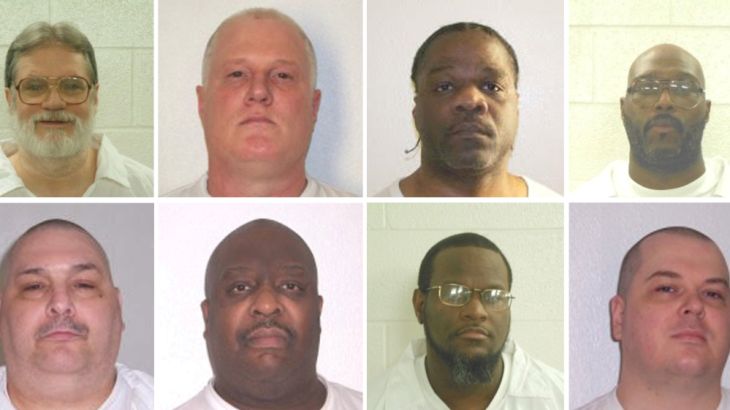Arkansas halts two executions after flurry of rulings
Legal wrangling continues over US state’s rush to execute six men before end of April when lethal drugs expire.

The US Supreme Court spared the life of two Arkansas inmates minutes before their death warrants were due to expire on Monday, scuttling efforts to resume the death penalty after nearly 12 years in the state with a plan to carry out four double executions before its supply of a lethal injection drug expires.
The court’s decision to maintain the stay for Don Davis and Bruce Ward capped a chaotic day of legal wrangling in state and federal courts to clear the primary obstacles Arkansas faced to carrying out its first executions since 2005.
Keep reading
list of 4 itemsRecord number of people executed for drug offences in 2023
Executions in Iran hit 8-year high in 2023
Australian writer Yang Hengjun sentenced to death on China spy charges
Arkansas Governor Asa Hutchinson, who had set the multiple executions, said the state would continue to push for the other lethal injections to be carried out. Two inmates are due to be put to death on Thursday.
Convicted of murder, Davis, 55, and Ward, 60, were being held in cells near the state’s death chamber and their execution warrants expired at midnight.
Davis was served his “last meal” of fried chicken, rolls, beans, mashed potatoes and strawberry cake as his fate was being decided, in the event that the US Supreme Court would give the green light for his execution.
READ MORE: Death penalty around the world in 2016
Arkansas had initially planned to execute eight prisoners in just 11 days – before its supply of a lethal injection drug expires on May 1. It has not found a new supplier of the controversial drug, midazolam.
Legal battles have prevented the state from executing any prisoner since 2005.
Anti-death penalty activists have protested against what has been labelled “assembly line killings”.
Lawyers argue that setting a “kill-by” date for so many prisoners at such short notice contravenes their constitutional right to due process.
‘Burning alive from inside while paralysed’
Hearings are being rushed, and lawyers who represent multiple prisoners say they cannot do their jobs.
“You could have one attorney watching one execution, while another client is trying to get his attention,” Rita Sklar of the American Civil Liberties Union (ACLU) told Al Jazeera.
Lawyers have also raised the constitutional prohibition on cruel and unusual punishment.
The sedative midazolam has been linked to several botched executions, and the ACLU says the prisoners are at risk of feeling “as if they are burning alive from the inside while paralysed”.
READ MORE: After death row – An unlikely love story
A federal appeals court on Monday overturned a district judge’s decision to halt the executions over the use of midazolam.
The appeals court said that the method of execution, which includes three different drugs, does not create undue severe pain.
A little over an hour later, the state Supreme Court lifted another judge’s ruling that had effectively blocked the executions by prohibiting the state from using its supply of vecuronium bromide, one of the other lethal injection drugs.
A medical supply company said it was misled by the state and that the drug was sold for medical purposes, not executions.
Al Jazeera’s Shihab Rattansi, reporting from Grady, Arkansas, described Monday’s flurry of rulings as “completely characteristic of the legal turmoil that’s been under way in Arkansas and in federal courts ever since the governor announced his plan to execute eight men over the course of 11 days.
“The attorney general’s office is already tweeting that it remains confident that the other men will be executed beginning from Thursday. Two men are due to be executed on Thursday but, as we have seen, legal proceedings may yet intervene.”
|
|
Davis and Ward wanted stays of execution while the US Supreme Court takes up a separate case concerning access to independent mental health experts by defendants.
The US High Court is to hold oral arguments on April 24.
The inmates’ lawyers argued that their clients were denied access to independent mental health experts, saying Ward has a lifelong history of severe mental illness and that Davis has an IQ in the range of intellectual disability.
Five votes are needed to vacate an execution stay, and Monday marked the first day the US Supreme Court was in session with new conservative Justice Neil Gorsuch on the bench.
Meanwhile, the Arkansas Supreme Court barred a state judge who blocked the multiple execution plan from taking up any death penalty-related cases after he participated in a protest where he appeared to mimic a death row inmate about to receive a lethal injection.
Justices reassigned any death penalty cases from Pulaski County Circuit Court Judge Wendell Griffen, who banned the state from using the vecuronium bromide obtained.
After issuing the order, Griffen participated in an anti-death penalty demonstration where he was strapped to a cot.
The High Court asked a disciplinary panel to consider whether Griffen violated the code of conduct for judges.